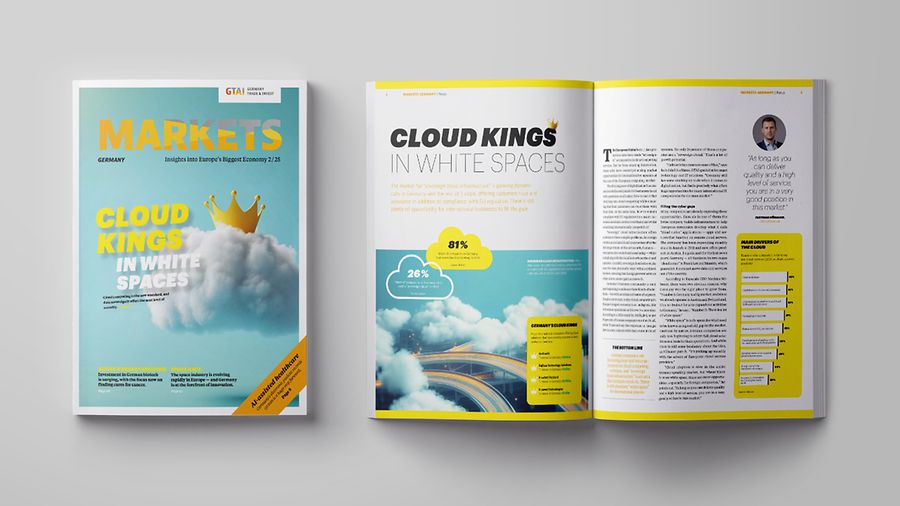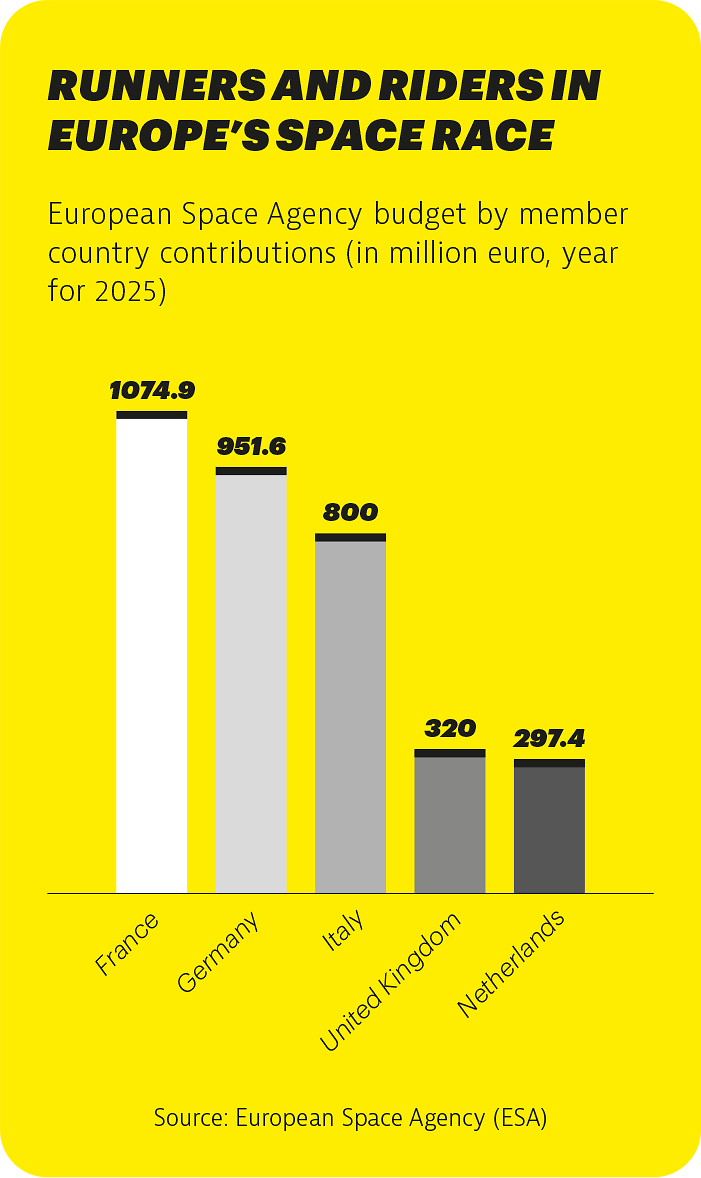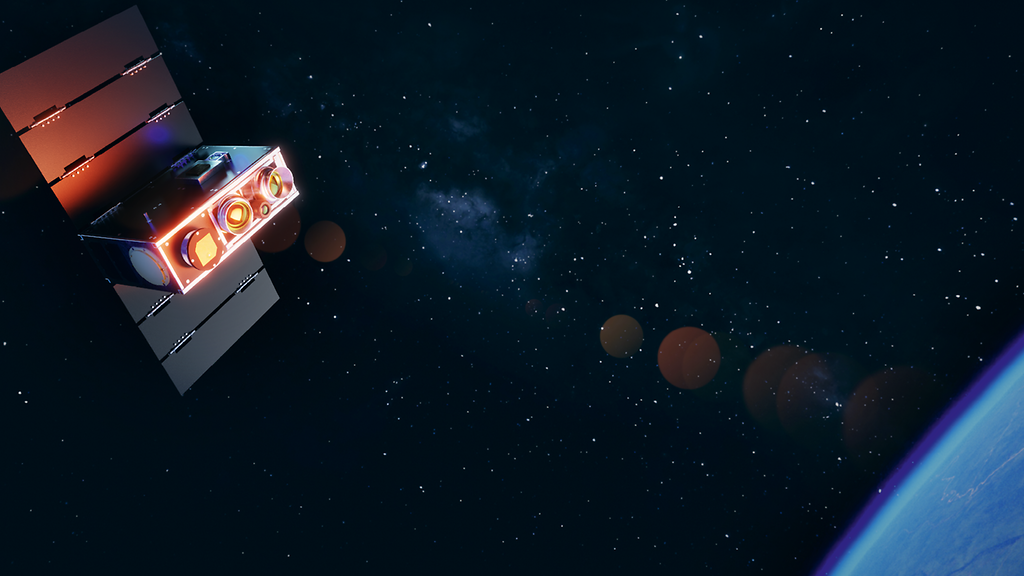Markets Germany Magazine 2/25 | Aerospace
Race to Space
Germany is at the fore of Europe’s rapidly expanding new space sector. The progressive commercialization of space travel is fostering a dynamic environment for international companies, driving pioneering technologies and creating lucrative business opportunities.
Jul 21, 2025
At present, there are more than 10,000 satellites orbiting the Earth, providing data for weather forecasting, navigation and numerous other services. In early 2025, two small German satellites developed by start-ups OroraTech and Constellr joined their ranks. The shoebox-sized objects collect thermal data to detect wildfires at an early stage, support sustainable urban planning and help agriculture adapt to climate change.
OroraTech and Constellr are spin-offs of renowned German research institutions. They typify the close cooperation between research and industry in Germany. The Fraunhofer Aviation & Space Network is another stellar example: It brings together 30 Fraunhofer institutes at the Fraunhofer ISC in Würzburg, southern Germany, to streamline synergies and create an ecosystem for the serial production of small satellites for commercial space applications.

This article was published in issue 2-2025 of the Markets Germany Magazine. Read more articles of this issue here
The global space industry is evolving at an unprecedented rate, with more and more commercial players now launching their own missions. This dynamic market offers exciting opportunities for both established developers and start-ups, specializing in everything from small satellite manufacturing to advanced carrier systems and beyond. High-tech ecosystems are emerging in many different parts of Germany, and the country is becoming an increasingly integral part of the global space economy.
Germany has a number of competitive advantages: world-class research networks, a highly skilled workforce, a strong supplier industry and a high degree of vertical integration. Spillover effects from industries such as automotive manufacturing further enhance its capabilities. Established space companies provide a broad foundation of experience and resources, while agile start-ups push the boundaries of what’s possible. This vibrant environment has led to a surge in patent applications, with Germany ranking third globally — behind only the United States and France — in space-related patent activity.
Germany is also a major contributor to the European Space Agency (ESA) and hosts several of its key sites, including the European Space Operations Centre in Darmstadt and the European Astronaut Centre (EAC) in Cologne. “Germany is building on its long-standing space heritage and is ideally positioned to be an international leader in the new space sector,” says Rainer Müller, aerospace expert at Germany Trade & Invest (GTAI). That’s down in no small measure to the many centers of expertise spread all over the country.
The Bottom Line
Germany is really lifting off in the global space economy. International businesses can gain a strategic advantage by expanding to this dynamic market.
Bavarian rocket revolution
Munich is one of Germany’s space hubs, thanks among other things to substantial investments by the Bavarian regional state government. Among the standout ventures is The Exploration Company (TEC), a German-French start-up developing reusable space capsules as a cost-effective and sustainable alternative to existing technology such as SpaceX’s Dragon. TEC’s Nyx capsule is designed for multiple missions, with a capacity to return up to 3,000 kilograms of cargo to Earth. TEC was the first European company to sign a Space Act Agreement with NASA and is targeting an unmanned mission to the International Space Station (ISS) in 2028.
Bavarian start-ups Isar Aerospace and Rocket Factory Augsburg (RFA) are involved in developing microlaunchers — smaller, more cost-effective rockets designed to deploy satellites efficiently. RFA recently became the first European company to secure a launch license for a privately developed rocket, with a maiden launch already scheduled. “We are strengthening Europe’s position in the global space market through cost-efficient and flexible launch options,” explains RFA co-founder Jörn Spurmann.
These start-ups benefit from a rich ecosystem featuring research institutions such as the German Aerospace Center (DLR), various institutes of the Max Planck Society, and multiple Fraunhofer institutes. A flagship project of ESA and the DLR is the new Moon Mission control center. Slated to become operational in 2027, it’s Europe’s answer to NASA’s Houston headquarters. Meanwhile, industry giants like Airbus and ArianeGroup also maintain strong presences in the Munich metropolitan area.
FDI Perspective: Satellite Control from Berlin
The US company Planet has had its European headquarters in Berlin since 2015, managing a fleet of approximately 200 satellites from the German capital.
Founded in 2010 by three NASA scientists, Planet established its European technology center in Berlin in 2015. There, space engineers, software developers and researchers oversee one of the world’s largest satellite fleets dedicated to Earth observation. The high-resolution imagery generated by these satellites supports a wide range of applications, including environmental monitoring, agriculture and urban planning. “Europe has positioned itself as a leader in Earth observation innovation, and we welcome the region’s continued investment in commercial space enterprises,” says Planet Senior Vice President Massimiliano Vitale.
Planet is a key partner for research in Europe, working closely with the European Space Agency and the Copernicus Earth observation program. The company aims to enhance existing capabilities by providing high-resolution satellite images. Planet’s small, cost-effective satellites can capture images of specific locations on Earth daily — or even hourly.
Beyond scientific research, Planet’s satellite data serves a diverse range of stakeholders, including corporations, governments, and NGOs. The technology plays a vital role in initiatives such as tracking illegal deforestation in the Amazon rainforest.
Looking ahead, Planet has ambitious goals. The company aspires to become the “Google of space.” In the future, its data could go beyond identifying environmental changes and be used in everyday applications such as providing real-time updates on available parking spaces in shopping centers.
450
satellites built by Planet to date
350 million
square kilometers of imagery captured daily by Planet’s satellites
180
employees working at Planet’s Berlin headquarters
Bremen data and lasers
Bremen has the highest proportion of aerospace experts in the total population of all of Germany, and its concentrated expertise offers ideal conditions for new space businesses. One company to profit from the ecosystem and particularly from close relations is OHB. The company traces its roots back to 1958 and remains family owned. Nonetheless it broke the one-billion-euro mark in turnover in 2023. In October 2024, the firm received a EUR 280 million contract to develop two new Earth Explorer Satellites for ESA’s Harmony mission.
“We’re very happy and proud to develop this important and complex earth-observation mission as the main contractor,” said OHB board member Rüdiger Schönfeld in a statement. “Harmony will provide valuable data to better understand our planetary systems and climate change.” In February 2025, OHB also signed a contract with ESA for the next phase of the OpSTAR project, which aims to exploit laser data transfer technology for satellite navigation.
Cologne lunar training
Western Germany plays a vital role in international space activities. The region is home to the DLR and the European Astronaut Centre, and recently the EU Commission selected the regional state of North Rhine-Westphalia as the site for a GOVSATCOM hub. This facility will provide secure, interference-resistant satellite communications for government agencies, emergency response teams and public institutions.
Another hub for space technology is Cologne, where the DLR and ESA have begun work on the lunar training and research facility LUNA. Spanning 700 square meters, this high-tech environment will replicate lunar conditions, complete with simulated craters, moon dust, reduced gravity and artificial sunlight. Designed for use by space agencies, universities, research institutes, and start-ups, it aims to provide a cutting-edge platform for experiments and technology development.
Total revenue generated by the German aerospace industry in 2023. This is an increase of 18% compared to the previous year.
Source: German Aerospace Industries Association
Dresden satellite propulsion
The Dresden region in eastern Germany is making notable contributions to new space technologies: Morpheus Space, a spin-off of the Technical University of Dresden (TUD), is pioneering electric-ion-propulsion systems based on Field Emission Electric Propulsion (FEEP) technology. These novel thrusters enable precise satellite maneuvering and collision avoidance while leveraging artificial intelligence for flight coordination.
Dresden’s aerospace ecosystem benefits from a strong research landscape and specialized suppliers, making it a leading hub for advanced space technologies. Collaborations between universities and the Fraunhofer Society institutions have created one of Europe’s strongest lightweight construction clusters. “Thanks to these specialized capabilities, we can develop highly complex components quickly and efficiently,” says Morpheus Space co-founder Daniel Bock.
To meet rising demand, Morpheus Space recently opened a new production facility in Dresden, reinforcing its position as a global leader in electric satellite propulsion. “Our goal is to expand our leadership in this field even further,” Bock adds. GTAI actively supports international businesses setting up shop in Germany by identifying optimal locations for production and R&D activities. “We help companies navigate Germany’s thriving new space ecosystem, ensuring they secure the best possible location for their investment,” explains Rainer Müller. Companies who manage to establish operations in Germany can exploit the expertise available the country’s many space clusters.
Germany is at the fore of Europe’s rapidly expanding new space sector. The progressive commercialization of space travel is fostering a dynamic environment for international companies, driving pioneering technologies and creating lucrative business opportunities.


